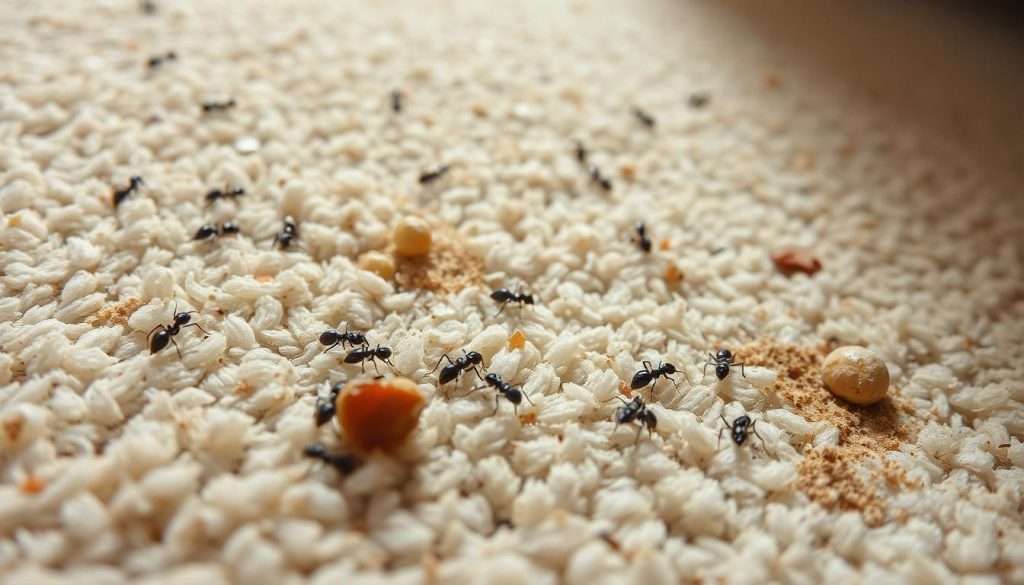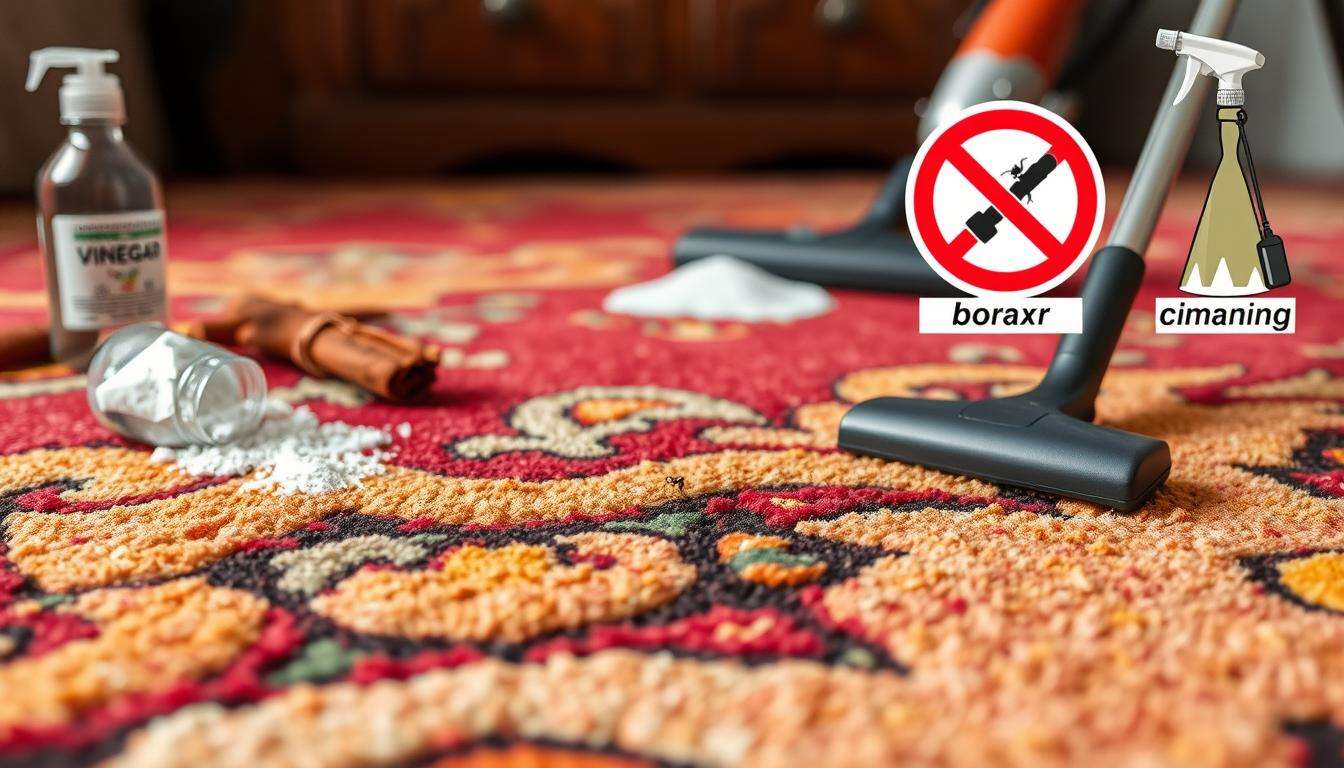Dealing with ants in your carpet can be frustrating. Ants are drawn to carpets because of food crumbs or moisture. They don’t live in your carpets but use them to find food and water.
This guide will help you get rid of ants in your carpet. We’ll cover how to spot ant problems and how to remove them. You’ll learn about vacuuming, using ant baits, and natural remedies to keep your home ant-free.
Key Takeaways
- Ants are usually drawn to carpets due to food crumbs and moisture.
- They can use carpets as pathways to access food and water.
- Effective methods for eliminating pests include vacuuming and using bait.
- Regular cleanliness and maintenance can prevent future infestations.
- Natural remedies are available and can complement conventional methods.
- Consider professional help if the ant problem becomes severe.
Understanding Ant Infestations in Your Carpet
Ants in homes, especially in carpets, can be a big problem. You might wonder why ants infest carpets. They are drawn to food like crumbs and moisture. These things give them food and a good place to live.
When the weather changes, ants look for food and water inside. Knowing what attracts them helps prevent ants in carpets.
Reasons for Ants in Carpets
Ants get into carpets for a few reasons:
- Food crumbs and spills from meals.
- Damp spots near plants or under sinks for water.
- Ant colonies nearby, looking for supplies.
- Seasonal changes, making them seek shelter indoors.
Knowing these reasons helps homeowners fight ants better.
Common Types of Ants Found in Carpets
It’s important to know the types of ants in carpets. Here are some common ones:
| Type of Ant | Size | Characteristics |
|---|---|---|
| Odorous House Ant | 1/8 inch | Brown or black; smells bad when squished. |
| Carpenter Ant | 1/4 to 1/2 inch | Dark brown or black; harms wood. |
| Pavement Ant | 2.5 to 4 mm | Brown or black; nests in pavement. |
| Argentine Ant | 2.2 to 2.8 mm | Light to dark brown; very aggressive. |
Knowing these ants helps you understand their behavior. If ants are a big problem, get professional help. Good pest control keeps your home safe from ants. For more info, check out this resource.
Signs of an Ant Problem
Spotting ant problems in your carpet early is important. Ants leave trails and clues that show where they are and where they come from. Knowing these signs helps you fight them off.
Identifying Ant Trails
Finding ant trails is key to stopping them. Look for ants marching in a line, usually to food or water. These paths can lead you to their nests or where they get in.
- Visible trails on the carpet surface.
- Black or dark smudges caused by the ants’ bodies.
- Areas around baseboards or corners where ants might congregate.
Recognizing Food and Moisture Sources
It’s important to find out what ants like to eat. They go for spills, crumbs, and pet food. They also like damp places. Check your carpets for:
- Spilled drinks or food remnants beneath furniture.
- Damaged areas in the carpet hinting at moisture issues.
- Distinct odors from trapped food particles.
After finding these problems, clean your carpets well. Professional cleaning can get rid of eggs and smells that attract ants. For more tips, check out this ant removal guide.

How to Get Rid of Ants in Carpet
To remove ants from your carpet, you need a plan. This plan includes vacuuming, using ant baits, and keeping things clean. These steps are important for getting rid of ants.
Vacuuming Techniques
Vacuuming is the first step to fight ants. Using the right techniques helps get rid of ants and their food. Here are some tips:
- Use a vacuum with a sturdy, crevice tool attachment to reach into corners and edges of carpets.
- Regularly vacuum high-traffic areas and underneath furniture where crumbs may accumulate.
- After vacuuming, dispose of the vacuum bag or contents outside to prevent ants from re-entering your home.
Using Ant Baits Effectively
Ant baits come in different forms like gel, liquid, and granules. Each has its own way to control ants:
- Gel baits are great because they attract ants, which then take the bait back to their colony.
- Granular baits can be sprinkled around affected areas, where ants can easily find them.
- When picking ant baits, choose ones that are safe for pets, like those with borax.
Cleaning and Removing Food Sources
Cleaning is crucial to keep ants away. Ants are attracted to food, so cleaning your carpet is important. Here’s how to keep your space clean:
- Make sure to vacuum and steam clean carpets often to get rid of food sources.
- Keep food in airtight containers and clean up spills right away to stop ants.
- Try using a mix of white vinegar and water to clean surfaces regularly.
By using these methods—efficient vacuuming, smart ant bait use, and regular cleaning—you can effectively deal with ants in your carpets.
Natural Remedies for Ant Control
Looking for ways to fight ants? Natural remedies are safe and effective. You can use common items found at home. These DIY solutions help you fight ants without harsh chemicals.
Utilizing Baking Soda and Sugar
A simple mix of baking soda for ants and sugar works well. Sugar draws ants in, while baking soda messes with their stomachs. This makes them dehydrate. Mix equal parts of baking soda and sugar and put it near ant trails.
White Vinegar as a Natural Repellent
White vinegar is great for cleaning and keeping ants away. It kills ants’ scent trails, so they can’t find their way back. Mix equal parts vinegar and water in a spray bottle. Spray it around entry points and where ants are seen.
Essential Oils for Deterrence
Peppermint and tea tree essential oils repel ants with their strong smell. Mix a few drops of your chosen oil with water in a spray bottle. Spray it where ants enter your home. This method is safe for pets and keeps ants away.

When to Consider Professional Ant Extermination
Knowing when to get help from ant control experts is key. Homeowners often struggle to spot severe ant infestations. Look out for these signs to know when to call for help.
Identifying Severe Infestations
Severe ant infestations need quick action. Watch for these signs:
- Frequent sightings of ants, especially in large numbers.
- Ants accessing multiple entry points, indicating nests nearby.
- Visible trails of ants that lead to food sources or nests.
- Presence of debris or frass, which indicates nesting sites.
Benefits of Hiring an Exterminator
When facing these challenges, hiring professional pest control is crucial. Here are the benefits of using ant extermination services:
- Access to professional-grade products that outperform typical consumer options.
- Experienced technicians can accurately identify species and nesting locations.
- Customized treatment plans designed to effectively target severe ant infestations.
- Ongoing maintenance options available, which can deter future outbreaks.
- Quick and thorough treatments, with initial visits generally taking around two hours.
Using professional pest control services is a smart move against persistent ant issues. The first treatment costs between $80 and $500. Ongoing plans vary based on the severity. Experts use advanced tools and knowledge to reduce ant damage and health risks.
Preventing Future Ant Infestations
Keeping your home clean and organized is key to stopping ants. Regular cleaning and sealing entry points are important. These steps help keep ants out by controlling your home’s environment.
Maintaining Cleanliness in Carpeted Areas
Ants love places with food and moisture. Cleaning often helps stop ants. Here are some good ways to keep your home clean:
- Vacuum carpets often to get rid of crumbs and food bits.
- Wipe down surfaces after eating to remove spills and leftovers.
- Try using vinegar to stop ants from following trails.
- Put cinnamon or coffee grounds around baseboards for extra defense.
- Fix leaks and damp spots fast, as ants are drawn to moisture.
Sealing Entry Points in the Home
Sealing off entry points is crucial to keep ants away. Ants can sneak in through small openings. Here’s how to protect your home:
- Look for gaps in foundations, windows, and doors and seal them with caulking.
- Fix broken screens on windows and doors to block ants.
- Check walls and floors for cracks where ants might get in.
- Use citrus peels near doors to keep ants away with their smell.
- Keep plants away from your house to block ant paths.
Following these cleaning and sealing tips can help a lot. A clean and sealed home is less likely to attract ants. Stay ahead of ants to keep your home comfortable and ant-free.
Additional Methods for Ant Removal
Ant infestations can be tough to deal with. But, there are many ways to fight back. We’ll look at using diatomaceous earth, ant baits, and DIY tricks to keep ants away.
Using Diatomaceous Earth and Other Powders
Diatomaceous earth is a safe way to control ants. It’s made from tiny fossils that harm ants. To use it:
- Sprinkle it where ants are seen.
- Don’t use too much to avoid clumps.
- Put it back after cleaning or if it gets wet.
Other powders, like baking soda and sugar, can also work. They lure ants and harm them inside.
Employing Liquid and Granular Ant Baits
Ant baits, liquid or granular, are great for fighting infestations. Liquid baits attract ants that carry poison back to their homes. Granular baits draw ants with food. To use them:
- Put them near ant paths.
- Follow the instructions for how much and where to place them.
- Check and replace them often.
This method helps you hit the ant colony hard, giving you an edge.
Exploring DIY Pest Control Solutions
Many people like making their own pest control. DIY solutions for ants are cheap and good for the planet. Here are some ideas:
- Make a spray with white vinegar and water to break scent trails.
- Use peppermint or lemon essential oils to repel ants. Mix with water and spray around doors.
- Make barriers with citrus peels or cayenne pepper. Ants don’t like these.
Using these methods and keeping your home clean can really cut down on ants in your carpets.
Conclusion
To fight ants in carpets, you need to know how ants act and take steps ahead of time. Spotting ants early is crucial for keeping them away. Clean often, seal up holes, and use smart ant control methods to lower the risk of ants coming back.
Regular vacuuming and keeping food in sealed containers are easy ways to keep ants out. These steps help a lot in keeping your home ant-free.
If ants are a big problem, you might need help from experts like Alpha Pest Control. Even though some treatments can be harmful, a clean home makes them work better. Natural options like cinnamon, lemon juice, and diatomaceous earth can also keep ants away without using harmful chemicals.
Using smart strategies and keeping your home clean helps you deal with ants better. The aim is to keep your home free from ants. Stay alert and enjoy a home without unwanted guests.
